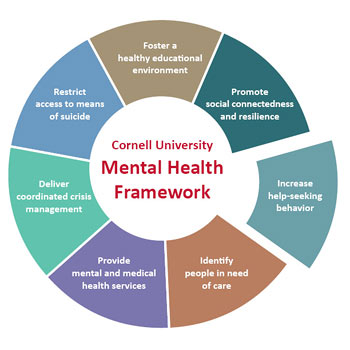Students run two mental health programs to promote resilience and help-seeking
By Nancy Doolittle

Students have always helped each other out, but now such peer-oriented programs as Cornell Minds Matter (CMM) and Empathy, Assistance and Referral Service (EARS) are finding new ways to help students cope with stress and access the resources and help they seek.
Begun in 2004, CMM seeks to increase awareness about mental health and provide ways for Cornell students to talk about and relieve daily stress. It has about 40 students who regularly attend events and an e-list of more than 1,400. It regularly sponsors panel discussions, workshops and speakers on such topics as relationships, medication, depression, positive psychology, using writing to get through the "rough spots" and coping creatively with stress. A large "Procrastinate at the Straight" event, held by CMM and other student organizations, provides free massages, craft projects, snacks and a social connection for students one evening a week at Willard Straight Hall. Another large event, the "Big Red Chill," will be held at Ho Plaza May 9 and at Mann Library May 10.
CMM's most popular event, says Casey Carr, CMM's adviser and assistant dean of students, is the annual "Dining with Diverse Minds" dinner. This past February more than 145 participants discussed "Cornell's caring community" with President David Skorton. Based on this success, CMM launched "Dining with Diverse Leaders" this April to facilitate discussion between student organization leaders and Vice President for Student and Academic Services Susan Murphy about Cornell's comprehensive efforts for student well-being.
Also new this year: outings to Taughannock Falls, the Japanese Tea Garden and "The King's Speech" movie, said Catherine Kim '12, CMM events coordinator.
The group encourages participants. "We meet great people from many different backgrounds," said Megan Sichler '12, CMM vice president of events. "There are always new ideas and new events."
While CMM focuses on programming as a way to promote mental health, EARS (founded in 1972) provides confidential, anonymous, peer counseling to help people clarify their own thoughts, feelings and strategies.
"EARS peer counselors are poised to provide a safe and supportive space for students in distress to talk about a whole range of experiences, from loneliness and relationship issues to concerns about not being 'smart enough' to questions about sexuality and self-identity," said Janet Shortall, assistant dean for undergraduate education. "They listen, reflect back the different concerns presented and help their peers engage in strategies for dealing with those concerns."
They might also suggest such resources and services as the ombudsman, a chaplain, the LGBT office or Gannett's Counseling and Psychological Services (CAPS). For those interested, they explain what someone can expect from one of the "Let's Talk" sessions available across campus or from a counseling session at CAPS.
Resources and service:
EARS peer counselors can be reached by calling 255-EARS (255-3277). They are also available at 213 Willard Straight Hall. For hours visit EARS website.
Information on Cornell Minds Matter, including a complete schedule of meetings and events, can be found at the Cornell Minds Matter website.
For more information on the many resources and services available for mental health concerns, visit the Caring Community website or read about the Gannett mental health framework.
"I decided to become a counselor ... because of the impact I've seen the EARS model have on helping people work through problems and difficult emotions," said one EARS peer counselor. "To me, the most important aspect of the EARS model of counseling is that it focuses on empowering the person with the problem to work through it themselves and find a solution that fits them best."
EARS peer counselors go through rigorous training in communication skills, relationship dynamics and active listening for three semesters, 12 weeks per semester. Their training includes practice counseling sessions and rigorous testing. Currently there are 49 peer counselors, 22 of whom are graduating this year.
"I am astonished that students can give at this level," Shortall said. "Their ability to slow down amidst their busy lives as students, put aside their own struggles and studies and be an empathic presence for those they are counseling is deeply inspiring," she said.
Media Contact
Get Cornell news delivered right to your inbox.
Subscribe